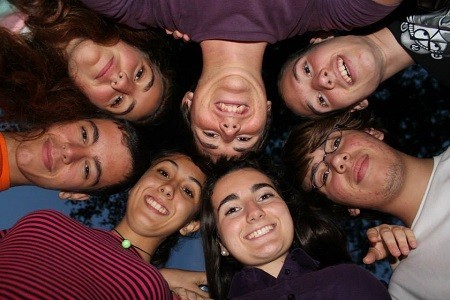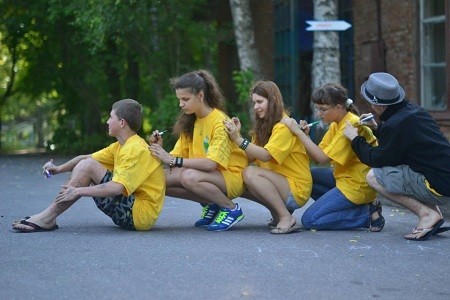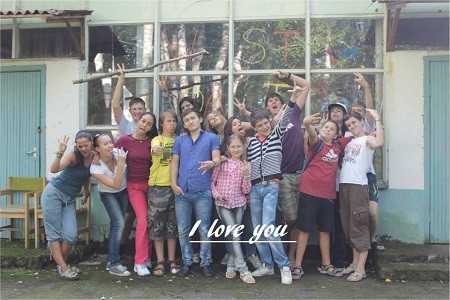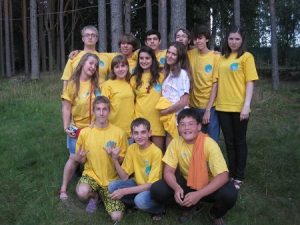 The second international multi-disciplinary camp «Formula of Unity» was organized by the Euler Foundation with the great assistance of St. Petersburg State University, and it took place from July 15 to July 31, 2013 in the recreational site «Parus» in the Leningrad Region. 83 schoolchildren participated in the camp, 48 of them represented Russia, and the others were from Spain, Kazakhstan, Croatia, Israel, Brazil and the United States. Almost all participants were 14–17 years old.
The second international multi-disciplinary camp «Formula of Unity» was organized by the Euler Foundation with the great assistance of St. Petersburg State University, and it took place from July 15 to July 31, 2013 in the recreational site «Parus» in the Leningrad Region. 83 schoolchildren participated in the camp, 48 of them represented Russia, and the others were from Spain, Kazakhstan, Croatia, Israel, Brazil and the United States. Almost all participants were 14–17 years old.
The camp was sponsored by:
- St. Petersburg State University,
- The Dynasty Foundation,
- Russian Venture Company OJSC
and three IT companies:
- St. Petersburg EMC Development Center,
- Evelopers LLC,
- «Total Objects» St. Petersburg».
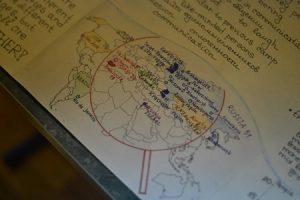 73 camp participants were divided according to their language and math skills into four groups. Their level was assessed with the Olympiad results and a test which was held on the first day of the camp. The classes for the groups «English‑A» and «English‑B» were conducted in English, but the «Russian‑A» and «Russian‑B» teams studied in Russian. Some days passed, and then all students were given the opportunity to change the group. 10 children were in a humanitarian group named «Ecology of communication». It was supervised by Galina Vladimirovna Kovtun from Krasnodar.
73 camp participants were divided according to their language and math skills into four groups. Their level was assessed with the Olympiad results and a test which was held on the first day of the camp. The classes for the groups «English‑A» and «English‑B» were conducted in English, but the «Russian‑A» and «Russian‑B» teams studied in Russian. Some days passed, and then all students were given the opportunity to change the group. 10 children were in a humanitarian group named «Ecology of communication». It was supervised by Galina Vladimirovna Kovtun from Krasnodar.
The Russian part of young mathematicians consisted mainly of the students who had successfully completed a distance mathematical club «Formula of Unity» at St. Petersburg State University, as well as of the successful participants of the similar previous camp. When students were invited to the club and the camp, the priority was given to children from small towns and rural areas, as they have fewer opportunities for obtaining extra-curriculum mathematical education.
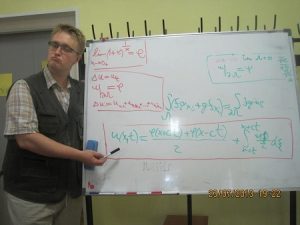 The camp curriculum consisted of 78 academic hours of classes. We had two days off with excursions to St. Petersburg. Traditionally, solving olympiad problems is the main activity for young mathematicians. And the main part of the course for the group «Russian‑A» had been created by I. Ibatulin.
The camp curriculum consisted of 78 academic hours of classes. We had two days off with excursions to St. Petersburg. Traditionally, solving olympiad problems is the main activity for young mathematicians. And the main part of the course for the group «Russian‑A» had been created by I. Ibatulin.
Moreover, there was a number of popular lectures on various topics, which were conducted by St. Petersburg scientists:
- V. Fedotov,
- M. Dvorkin,
- A. Minarsky,
- as well as by V. Gaton and K. Verdun, the heads of the delegations from Valladolid and Brazil.
- F. Petrov also read a mini-course about elements of number theory.
One day six «mathematical fights» took place (this is a type of a traditional competition between two teams of mathematicians). Participants were divided into 9 teams; three teams representing the «Formula of Unity» competed with teams from another camp (Summer Computer and Mathematical School), and the other 6 teams — among themselves.
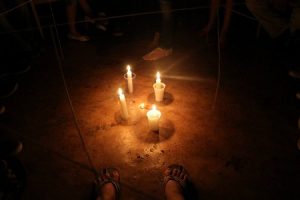 The life in the camp during the off-school time was organized on the basis of I. Ivanov’s method of collective creative education; tutors from the pedagogical group «Change» at Leningrad State University named after A. Pushkin organized the work with this technique, which is also called pedagogy of common concern. The participants were divided into 6 teams of 13–16 children of different ages, different nationalities, different classes. Every day the teams participated in collective creative activities, which had usually been developed by the participants themselves at so-called «Case Councils». At the evening «lights» (candles), the teams analyzed their work, selected new duty commanders, and discussed their traditional creative assignments.
The life in the camp during the off-school time was organized on the basis of I. Ivanov’s method of collective creative education; tutors from the pedagogical group «Change» at Leningrad State University named after A. Pushkin organized the work with this technique, which is also called pedagogy of common concern. The participants were divided into 6 teams of 13–16 children of different ages, different nationalities, different classes. Every day the teams participated in collective creative activities, which had usually been developed by the participants themselves at so-called «Case Councils». At the evening «lights» (candles), the teams analyzed their work, selected new duty commanders, and discussed their traditional creative assignments.
In little periods of free time, the children participated in a «task to choose» (an activity that they invented and organized themselves and the others could choose from a variety of offered activities), for example, language classes:
- Russian language (for foreigners),
- English,
- Spanish,
- Portuguese
- and Esperanto.
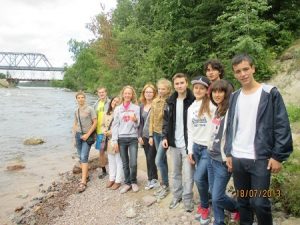 There were two days off with two excursions to the Peter and Paul Fortress, the Winter Palace, the Savior on Blood and St. Isaac’s Cathedral, as well as a boat trip along the rivers and canals of St. Petersburg.
There were two days off with two excursions to the Peter and Paul Fortress, the Winter Palace, the Savior on Blood and St. Isaac’s Cathedral, as well as a boat trip along the rivers and canals of St. Petersburg.
The group «Ecology of verbal communication» not only studied but also published a newspaper.
The participants went home, planning to meet again in the winter camp and next summer, where we plan to organize more different classes. And some of the guys will be able to go to the camp to Spain, which will be organized by the University of Seville next summer.
No doubts that the dearest memory of the camp was the T‑shirts. It is not so much the logo of the program that is important, but all those friendly pleasant wishes that children left to each other.
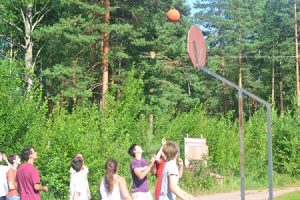 Sports activities were also in abundance: on the day of the Olympic Games, everyone played volleyball, football, frisbee, board games and basketball. The most popular game was, of course, football.
Sports activities were also in abundance: on the day of the Olympic Games, everyone played volleyball, football, frisbee, board games and basketball. The most popular game was, of course, football.
Within the framework of the camp, there was also a four-day seminar on the methods of collective creative education (CCE, KTD in russian), where the teachers who were accompanying the delegations and the participants from different Russian cities participated. The seminar was held by Svetlana Platonova, the assistant professor of Leningrad State University named after A. Pushkin, a member of the Makarenko’s Commune.
